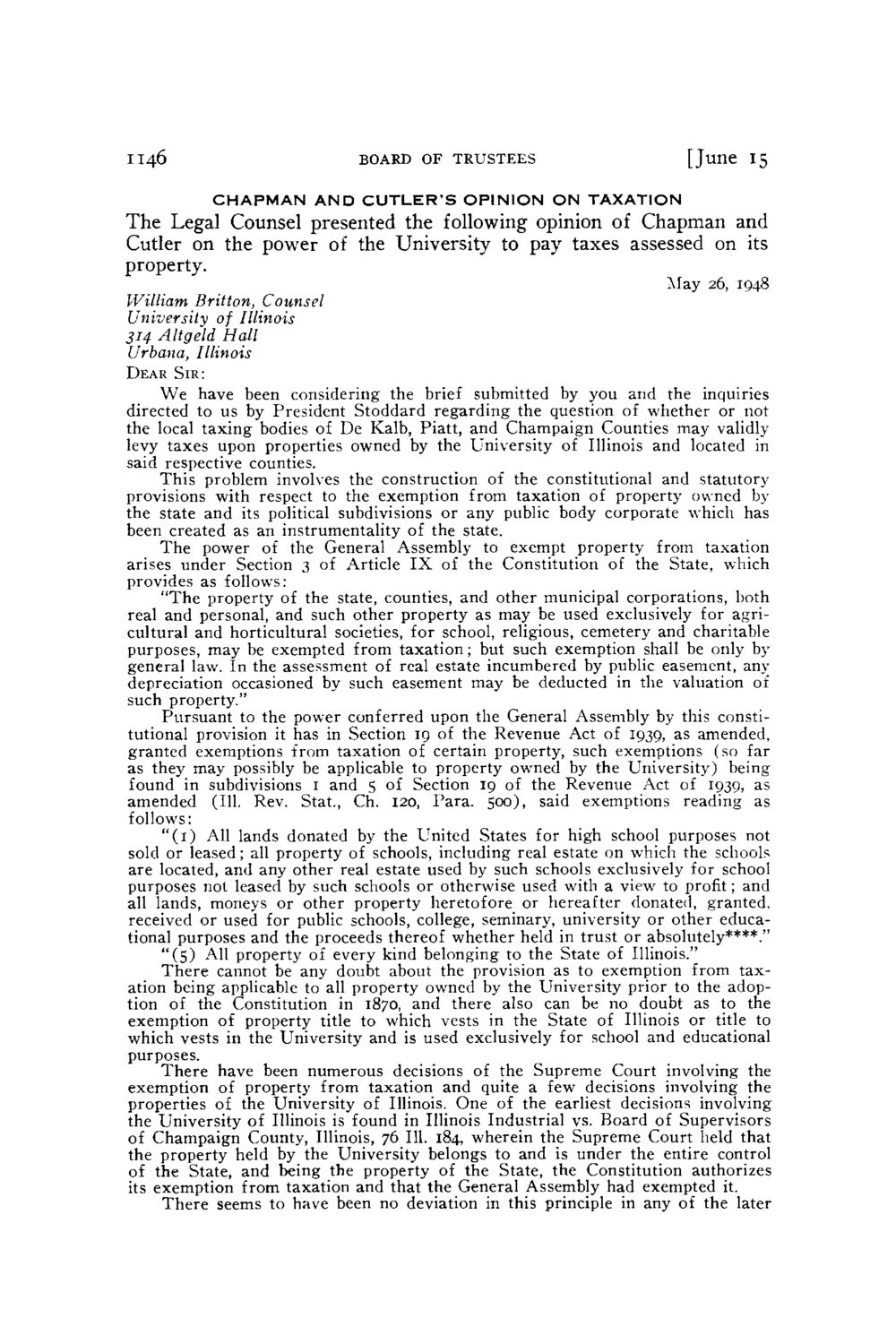| |
| |
Caption: Board of Trustees Minutes - 1948
This is a reduced-resolution page image for fast online browsing.

EXTRACTED TEXT FROM PAGE:
1146 BOARD OF TRUSTEES CHAPMAN A N D C U T L E R ' S OPINION ON TAXATION [June 15 The Legal Counsel presented the following opinion of Chapman and Cutler on the power of the University to pay taxes assessed on its property. May 26, 1948 William Britton, Counsel University of Illinois 314 Alt geld Hall Urbana, Illinois DEAR S I R : We have been considering the brief submitted by you and the inquiries directed to us by President Stoddard regarding the question of whether or not the local taxing bodies of De Kalb, Piatt, and Champaign Counties may validly levy taxes upon properties owned by the University of Illinois and located in said respective counties. This problem involves the construction of the constitutional and statutory provisions with respect to the exemption from taxation of property owned by the state and its political subdivisions or any public body corporate which has been created as an instrumentality of the state. The power of the General Assembly to exempt property from taxation arises under Section 3 of Article I X of the Constitution of the State, which provides as follows: "The property of the state, counties, and other municipal corporations, both real and personal, and such other property as may be used exclusively for agricultural and horticultural societies, for school, religious, cemetery and charitable purposes, may be exempted from taxation; but such exemption shall be only by general law. In the assessment of real estate incumbered by public easement, any depreciation occasioned by such easement may be deducted in the valuation of such property." Pursuant to the power conferred upon the General Assembly by this constitutional provision it has in Section 19 of the Revenue Act of 1939, as amended, granted exemptions from taxation of certain property, such exemptions (so far as they may possibly be applicable to property owned by the University) being found in subdivisions 1 and 5 of Section 19 of the Revenue Act of 1939, as amended (111. Rev. Stat., Ch. 120, Para. 500), said exemptions reading as follows: " ( 1 ) All lands donated by the United States for high school purposes not sold or leased; all property of schools, including real estate on which the schools are located, and any other real estate used by such schools exclusively for school purposes not leased by such schools or otherwise used with a view to profit; and all lands, moneys or other property heretofore or hereafter donated, granted, received or used for public schools, college, seminary, university or other educational purposes and the proceeds thereof whether held in trust or absolutely****." " ( 5 ) Ah property of every kind belonging to the State of Illinois." There cannot be any doubt about the provision as to exemption from taxation being applicable to all property owned by the University prior to the adoption of the Constitution in 1870, and there also can be no doubt as to the exemption of property title to which vests in the State of Illinois or title to which vests in the University and is used exclusively for school and educational purposes. There have been numerous decisions of the Supreme Court involving the exemption of property from taxation and quite a few decisions involving the properties of the University of Illinois. One of the earliest decisions involving the University of Illinois is found in Illinois Industrial vs. Board of Supervisors of Champaign County, Illinois, 76 111. 184, wherein the Supreme Court held that the property held by the University belongs to and is under the entire control of the State, and being the property of the State, the Constitution authorizes its exemption from taxation and that the General Assembly had exempted it. There seems to have been no deviation in this principle in any of the later
| |